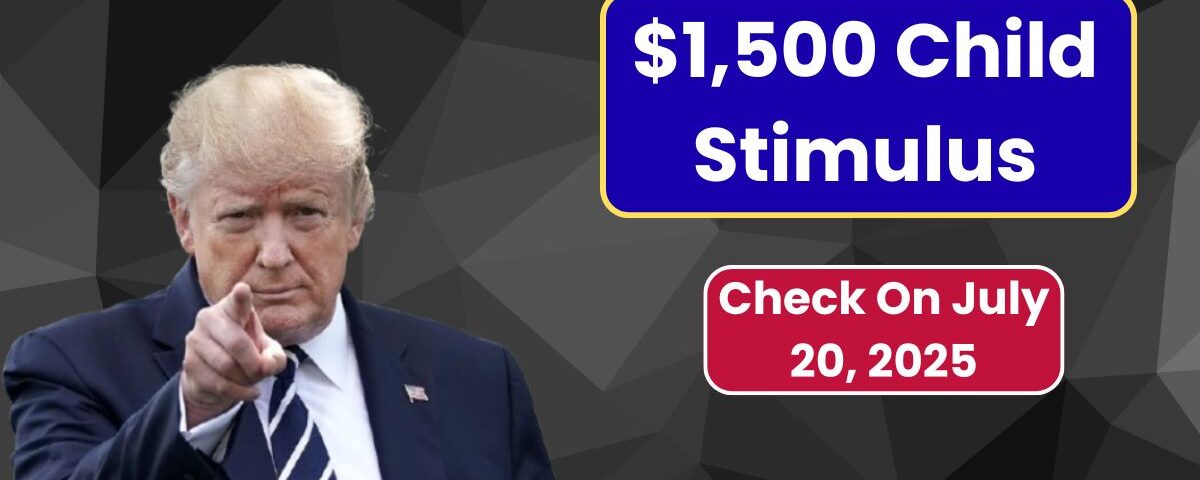A new $1,500 child stimulus payment may be coming on July 20, 2025, and families across the U.S. are eager to know if they qualify. If you’re a parent or guardian, this article will help you understand the eligibility rules, payment details, and most importantly — how to claim your money fast.
Let’s break everything down in simple, easy-to-understand terms so you can be ready before the deadline.
What Is the $1,500 Child Stimulus?
The $1,500 child stimulus payment is part of a proposed relief plan by the federal government. It’s designed to help families cover the rising cost of living, especially those with children.
While the IRS hasn’t officially confirmed it yet, trusted sources suggest that payments may be released around July 20, 2025 if approved by Congress. Many families could receive $1,500 per eligible child — similar to earlier Child Tax Credit or COVID-era payments.
Who May Qualify?
Eligibility depends on a few important things like your income, filing status, and number of children. Use this table to quickly check if you may qualify:
| Requirement | Details |
|---|---|
| Income Limit | Under $75,000 (single) / $150,000 (married) |
| Child Age | Under 17 years old as of Dec 31, 2024 |
| Tax Filing | Filed 2023 taxes or signed up via IRS tools |
| Residency | U.S. resident with valid SSN/ITIN |
| Citizenship Status | Must be U.S. citizen or legal resident |
If your income is slightly above the limit, you may still get a reduced payment.
How Much Will You Get?
Here’s a simple breakdown of possible payment amounts:
| Number of Eligible Children | Total Stimulus You May Receive |
|---|---|
| 1 | $1,500 |
| 2 | $3,000 |
| 3 | $4,500 |
| 4 | $6,000 |
Remember, these numbers are estimates based on what is currently known.
How to Claim the $1,500 Child Stimulus
If this stimulus gets approved, claiming it will be simple, especially if you’ve filed taxes in 2023 or 2024.
Steps to Claim:
- File Your 2023 or 2024 Taxes
Make sure you’ve filed your federal tax return. The IRS will use this to send your payment. - Update Info on IRS Portal
If your child was born recently or you changed banks, use the IRS Child Tax Credit Update Portal (if reopened). - Watch for IRS Notices
The IRS may send letters or emails about your eligibility. Don’t ignore them. - Set Up Direct Deposit
This is the fastest way to get your money. - Check IRS.gov Regularly
Stay updated by checking the IRS website or signing up for their official alerts.
When Will You Get Paid?
If everything goes as expected, payments may start rolling out on or after July 20, 2025. Most eligible families will receive their money through direct deposit. If the IRS doesn’t have your banking info, you’ll likely get a mailed paper check or prepaid card.
What If You Don’t Get It?
Here’s what to do if you don’t receive your payment by August:
- Check IRS “Get My Payment” Tool (if active)
- Verify your bank account or address
- Call IRS support or contact your local tax office
Final Tips to Get Your Money Fast
To make sure you don’t miss out, follow these quick tips:
- File your taxes early
- Keep your IRS info updated
- Set up direct deposit
- Watch your mail and email
- Stay informed via IRS.gov
Conclusion
The $1,500 Child Stimulus Payment for July 20, 2025 could be a big help for millions of American families. Whether you’re struggling with bills, saving for school, or just need a little boost — this relief plan might give you the support you need.
Don’t wait until the last minute. Check your eligibility, file your taxes, and stay informed so you can claim your child’s stimulus quickly and without stress.
Common Questions (FAQs)
1. Do I need to apply separately?
No, if you filed taxes, the IRS will process your payment automatically.
2. What if I had a baby in 2024?
You may still qualify — update your dependent info with the IRS as soon as possible.
3. Can I still get the money if I owe taxes?
In most cases, yes. Stimulus payments usually aren’t taken for back taxes.
4. Will there be more payments later in 2025?
It’s possible. If this round is successful, more child benefits may follow.
5. Can non-citizen parents qualify?
Yes, if their child has a valid Social Security Number and they meet income/residency rules.
